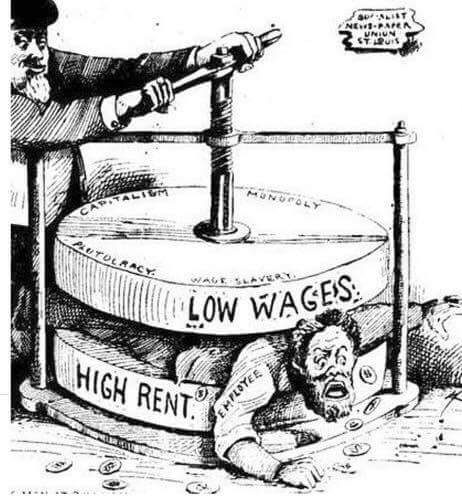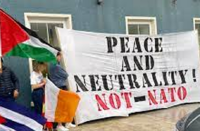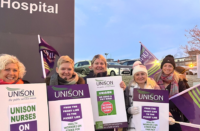This summer has indeed been very different from summers of the past—and it wasn’t just the long period of hot weather.
There has been a sustained period of civil disobedience by ordinary citizens, who have been marginalised by high rents and low pay as a result of the neo-liberal policies of the Fine Gael government, propped up by Fianna Fáil and a number of independent TDs.
It exploded onto social media in the last week of July when the armed Special Response Unit of the Garda Síochána was used to evict a number of Connolly Youth Movement activists from two houses that they had been squatting in in Cork.
The CYM have been squatting in another premises for well over a year, and continue to do so. This brought their activity into the public glare, thanks to the over-the-top methods used by the state in the eviction of these young people. They have been squatting in these buildings to publicise the housing crisis and to raise the demand for universally accessible public housing to be made available to all citizens as a right, with rents linked to income.
Following this, a coalition of housing activist groups occupied a number of houses in Summer Hill Parade in Dublin, also to highlight the housing crisis and to demand the building of public housing. These houses are owned by a slum landlord, who had them split into multiple flats, with up to eight people sharing one room and with bunk beds to sleep on.
The houses had been closed down several months ago because these conditions breached fire regulations. The landlord eventually got the tenants evicted from the premises—but not before they occupied the Department of Housing in the Custom House, demanding to meet the minister for housing, Eoghan Murphy.
Eventually they were given a date for meeting the minister the following week, as he was away enjoying his holidays. They then ended the occupation of the Custom House and returned to Summer Hill.
An injunction against the Summer Hill occupation was obtained by the property-owner, so they left the premises in Summer Hill Parade and immediately occupied another vacant house, in North Frederick Street.
At the time of writing they are under threat of eviction here also. They say that if they are evicted from here they will just take over another vacant house, and continue to do this until the state gives in to their demands.
Such is the anger felt by ordinary working people as a result of the housing emergency.
There was a time when one person working was able to provide a modest life for a family. This ended about thirty years ago, since when it has been essential to have two wages coming in to provide food and shelter for an average family.
Citizens are beginning to realise that this is no longer possible. Owning a home is a thing of the past, even with two wages.
According to the 2016 census, private rental accommodation is now the main type of tenure in our cities and towns, for the first time in the history of the country. And overcrowding has increased, also for the first time in more than fifty years, or since the tenements were cleared.
Thus was the housing crisis being brought to centre stage by a citizens’ protest.
Communities Against Low Pay
The next significant event was the formation of a group called Communities Against Low Pay. This is a grass-roots community organisation who say they are fed up with the poverty wages being offered by hugely profitable companies, and they are planning a national campaign to publicise it.
An emboldened people are now linking low pay and high rents as the root of the problem, as the gap between rich and poor explodes.
The first actions CALP have carried out were a number of vigils in support of the striking workers in Lloyd’s Pharmacy. They were able to hold vigils where striking workers are forbidden to picket, and successfully turned the tables on the restrictions imposed by the Industrial Relations Act (1990). A number of Lloyd’s branches were empty of customers as citizens backed the workers and not the employers, who pay poverty wages and won’t recognise their union.
These demonstrations have been held at numerous Lloyd’s branches and have been receiving overwhelming support from ordinary citizens, who are now in large numbers refusing to do business with Lloyd’s Pharmacy. The company has refused to implement the recommendations of the Workplace Relations Commission, and continues to refuse to recognise their employees’ trade union, Mandate, as the representative body for their workers.
Defending the public bus service
The next thing to hit the headlines was the National Transport Authority’s top-down plan called “Bus Connects,” which is a total change in the way the public bus service would be operated in Dublin. Not only is this a reduction in service to the citizens but many people believe it is just an Expressway to privatisation.
Public meetings have been held by many local communities around the city, filled to capacity, such is the anger of citizens, who are very much against the proposed changes to their public transport service.
No more!
These events are unprecedented and reflect the growing anger of the people against Government policy. The Government is seen to be totally out of touch with the hardship being suffered by the community. But people are getting up off their knees. They realise that they have power and that they can effect change when they stick together and fight back.
The summer of 2018 looks like a starting-point from where the ordinary people of Ireland finally rejected the establishment narrative and at long last gained the confidence to stand up and say, No more!






